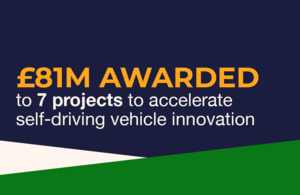Passengers will be boarding the world’s first fully sized, self-driving bus service in Edinburgh from the Spring, after it was awarded a share of £81 million in joint UK government and industry support for self-driving transport technology.
The project is one of seven successful projects from around the UK, and forms the most advanced set of commercial, self-driving passenger and freight operations anywhere in the world.
The grants, part of the Centre for Connected and Autonomous Vehicles Connected and Automated Mobility programme, will help British companies seize early opportunities to develop experimental projects into offerings ready for the market.
The joint government and industry funding winners are:
- CAVForth II – Fusion Processing – £10.4 million to launch the world’s first operational, full-sized, self-driving bus service, in Edinburgh, with Stagecoach and Alexander Dennis
- V-CAL – North East Automotive Alliance – £8 million to roll out self-driving and remotely piloted HGVs between the Vantec and Nissan sites in Sunderland
- Hub2Hub – HVS – £13.2 million to develop a new, zero emissions, self-driving HGV with Asda
- Sunderland Advanced Mobility Shuttle – City of Sunderland Council – £6 million to build and trial a self-driving shuttle service to the University of Sunderland and the Sunderland Royal Hospital
- Project Harlander – Belfast Harbour – £11 million to deploy a self-driving shuttle service around Belfast Harbour
- Multi-Area Connected Automated Mobility – Conigital – £15.2 million to establish a remote driving control hub, to oversee self-driving vehicles operating in Solihull and Coventry, with the NEC and local councils.
- Project Cambridge Connector – Greater Cambridge Partnership – £17.4 million to trial on-demand, self-driving taxis, to complement existing transport services in parts of Cambridge
£42 million in government funding is being matched by industry.
Business Secretary Grant Shapps said:
In just a few years’ time, the business of self-driving vehicles could add tens of billions to our economy and create tens of thousands of jobs across the UK. This is a massive opportunity to drive forward our priority to grow the economy, which we are determined to seize.
The support we are providing today will help our transport and technology pioneers steal a march on the global competition, by turning their bright ideas into market-ready products sooner than anyone else.
Transport Secretary Mark Harper said:
Self-driving vehicles including buses will positively transform people’s everyday lives – making it easier to get around, access vital services and improve regional connectivity.
We’re supporting and investing in the safe rollout of this incredible technology to help maximise its full potential, while also creating skilled jobs and boosting growth in this important sector.
Almost £600,000 is also being awarded for feasibility studies, looking into how self-driving technology could improve public transport in four parts of the UK. These projects will look into potential routes where automated vehicles could operate exclusively from other traffic, to relieve congestion on the A414 through Hertfordshire and Essex, parts of Eastern Cambridge, Birmingham and Solihull, and Milton Keynes.
Innovate UK Executive Director for Net Zero, Mike Biddle, said:
The Connected and Automated Mobility (CAM) sector is of crucial importance to the UK, with the potential to deliver safer, cleaner and more efficient transport systems across a wide range of settings.
This latest, multi-year round of government’s Commercialising CAM funds builds on the success of previous collaborative R&D programme, stimulating innovation to ensure the UK is at the forefront of the transition towards the commercialisation of self-driving services.
Self-driving vehicles could revolutionise public transport and passenger travel, especially for those who don’t drive, better connect rural communities and reduce road collisions caused by human error. Forecasts predict that by 2035, 40% of new UK car sales will have self-driving capabilities, with a total market value for connected and automated mobility worth £41.7 billion to the UK. This could create nearly 40,000 skilled jobs in connected and automated vehicle (CAV) technology.
The government is also committed to introducing legislation that will enable the safe and timely rollout of self-driving vehicles on UK roads. Under a proposed ‘safety ambition’ for self-driving vehicles to be equivalent in safety to a competent and careful human driver, vehicles will need to meet certain standards to be allowed to ‘self-drive’ on the roads throughout the lifetime of the vehicle. Organisations overseeing self-driving vehicles could face sanctions if standards are not maintained.














